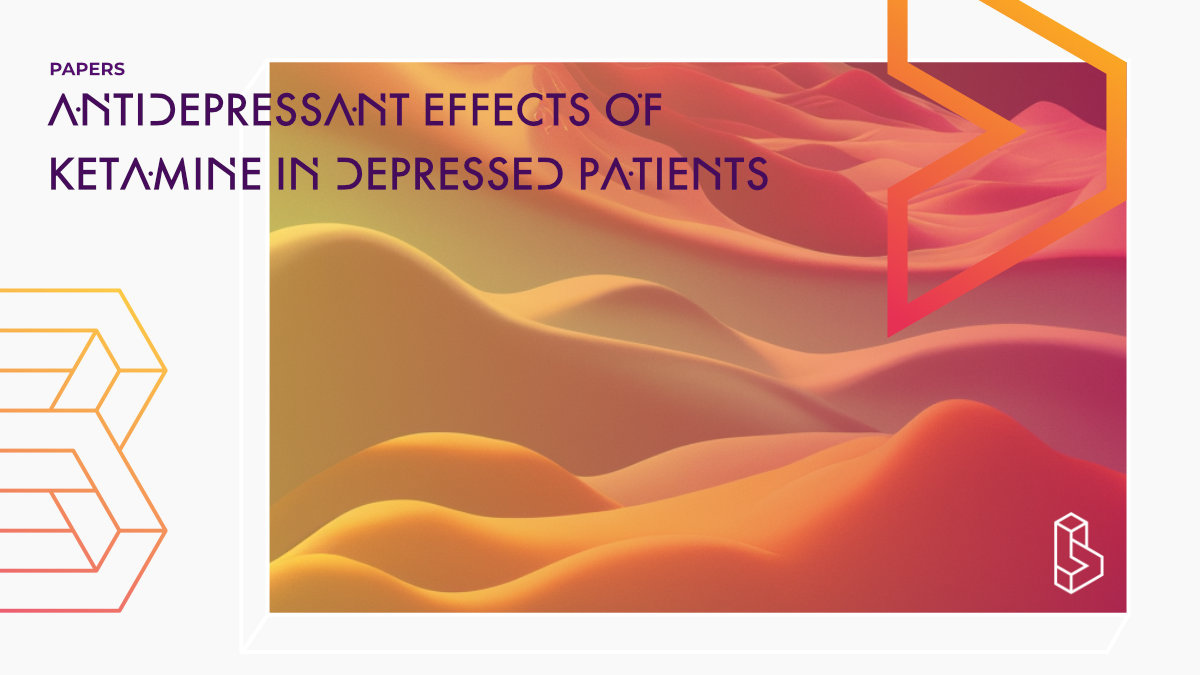This double-blinded, randomized, placebo-controlled, within-subjects study (n=7) investigated the antidepressant efficacy of a single dose of ketamine (35mg/70kg) in patients with depression and found significant improvements in depressive symptoms within 72 hours after infusion.
Abstract of Antidepressant effects of ketamine in depressed patients
“Background: A growing body of preclinical research suggests that brain glutamate systems may be involved in the pathophysiology of major depression and the mechanism of action of antidepressants. This is the first placebo-controlled, double-blinded trial to assess the treatment effects of a single dose of an N-methyl-D-aspartate (NMDA) receptor antagonist in patients with depression.
Methods: Seven subjects with major depression completed 2 test days that involved intravenous treatment with ketamine hydrochloride (.5 mg/kg) or saline solutions under randomized, double-blind conditions.
Results: Subjects with depression evidenced significant improvement in depressive symptoms within 72 hours after ketamine but not placebo infusion (i.e., mean 25-item Hamilton Depression Rating Scale scores decreased by 14 6 SD 10 points vs. 0 6 12 points, respectively during active and sham treatment).
Conclusions: These results suggest a potential role for NMDA receptor-modulating drugs in the treatment of depression.”
Authors: Robert M. Berman, Angela Cappiello, Amit Anand, Dan A. Oren, George R. Heninger, Dennis S. Charney & John H. Krystal
Summary of Antidepressant effects of ketamine in depressed patients
Preclinical research implicates the NMDA receptors in the pathophysiology of major depression and the mechanism of action of antidepressant treatments. Antidepressant administration alters the potency of glycine to inhibit strychnine-insensitive glycine sites, making this a more sensitive predictor of antidepressant activity than the forced swim test or downregulation of beta-adrenergic receptors.
Although preliminary studies with amantadine and D-cycloserine suggest that NMDA receptor antagonists have antidepressant activity, clinical investigation of NMDA receptor function in depression is currently limited by the availability of selective compounds.
Find this paper
Antidepressant effects of ketamine in depressed patients
https://doi.org/10.1016/S0006-3223(99)00230-9
Open Access | Google Scholar | Backup | 🕊
Cite this paper (APA)
Berman, R. M., Cappiello, A., Anand, A., Oren, D. A., Heninger, G. R., Charney, D. S., & Krystal, J. H. (2000). Antidepressant effects of ketamine in depressed patients. Biological psychiatry, 47(4), 351-354.
Study details
Compounds studied
Ketamine
Topics studied
Depression
Study characteristics
Placebo-Controlled
Double-Blind
Within-Subject
Randomized
Participants
7
Humans
Compound Details
The psychedelics given at which dose and how many times
Ketamine 35 mg | 1x
